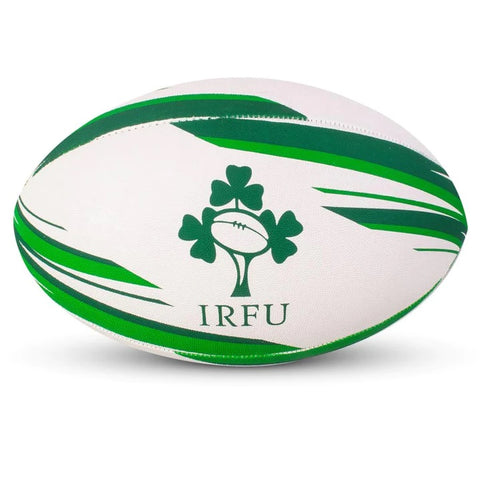Weight of a Rugby Ball
In the world of rugby, every detail counts, including the weight of a ball used in play. At UK Rugby Store, we understand the pivotal role that high-quality rugby balls play in the game's dynamics and a player's performance.
This article will dive into the weight of a rugby ball and guide you through selecting the best rugby balls from our extensive collection.
Whether you're a seasoned player or new to the sport, join us as we explore everything from the materials and construction of rugby balls to their history and how to choose the right one for your needs.
What this article covers:Weight of a Rugby Ball
In our experience, the weight of a rugby ball, as well as rugby ball shape, is a critical factor that affects how it performs in the air and the player's hands during a game.
Regulation rugby balls, as specified by World Rugby, must weigh between 410 to 460 grams. This weight range ensures the ball is heavy enough to travel accurately over long distances, yet light enough to be handled deftly during play.
Rugby Ball Guide
Materials
As per our practical expertise, the materials used in rugby balls are crucial for their performance and durability. Modern rugby balls are typically made from a blend of synthetic materials, such as rubber, polyurethane (PU), or a mixture of both, offering superior grip, weather resistance, and longevity.
At UK Rugby Store, our selection features balls made from quality, robust materials, ensuring that avid players or rugby enthusiasts have the best equipment for games or casual passing around at your weekend barbeque.

Size And Shape
Rugby balls come in various sizes, from size 3 for juniors to size 5 for seniors, ensuring players of all ages can find a ball that's appropriately sized for their hands and level of play.
The oval shape is designed for easier handling and to facilitate the distinctive passing style of rugby.
Rugby Ball Grip
The grip on a rugby ball is crucial for players to handle, pass, and kick the ball effectively under various conditions. Modern rugby balls have a textured surface, often with raised dimples, designed to enhance grip even in wet or slippery conditions.
This textured grip allows for better control over the ball, improving the accuracy and distance of passes and kicks.
Manufacturers continuously innovate the grip technology to optimize performance, ensuring that players can maintain a firm hold on the ball during play.
The balls we offer at UK Rugby Store come with textured surfaces to enhance grip, allowing for more accurate passing and catching.
Panel Construction
Rugby ball panel construction is integral to its performance, affecting aerodynamics, grip, and durability. Traditional rugby balls were made with four panels, but modern designs can vary, incorporating more panels to improve the ball's shape retention and flight characteristics.
The panels are stitched together, often with a synthetic material inside to maintain air retention and shape. This construction method ensures that the ball withstands the rigours of play while providing a consistent experience for passing, kicking, and handling.
Bladder
The bladder is the inner component of a rugby ball that holds air, crucial for maintaining its shape and proper inflation.

Based on our observations, typically made from latex or synthetic materials, bladders are designed to ensure optimal air retention and elasticity, which affect the ball's feel and performance during play.
Valve Shape And Placement
The valve in a rugby ball, where air is pumped in, plays a significant role in the ball's aerodynamics and handling. Modern rugby balls often have the valve placed strategically in the seam to reduce air resistance and improve the ball's flight path.
The shape of the valve is engineered to be seamless and unobtrusive, minimising the impact on the player's grip and the ball's overall performance.
History
The legendary rugby ball has a unique history, originating from the early days of the game in the 19th century. Initially, rugby balls were made from pig's bladder, covered with leather for durability.
The shape evolved from a plum to the distinctive oval we recognize today, influenced by the need for easier handling and kicking. This evolution reflects the development of rugby itself, transitioning from a school game to an international sport.
The materials and design have advanced, with synthetic materials now used for better performance and consistency.
Rugby Balls - Which Ball Do I Need?
Choosing the right rugby ball depends on several factors, including the level of play, playing conditions, and personal preference.
For training purposes, a durable ball with a good grip might be prioritised, while match balls are designed for peak performance and aerodynamics. Juniors might start with smaller-sized balls, moving up as they grow and their skills develop.
Here are some of the best rugby balls on the market today.
Ireland RFU Rugby Ball
Celebrate your passion for Irish rugby with the official Ireland RFU Rugby Ball. Its superior design reflects the strength and spirit of the Ireland rugby team.
Perfect for fans and players alike, this ball is a must-have for anyone looking to bring a piece of the game home.
Scotland RU Rugby Ball
Embrace the Scottish rugby legacy with the Scotland RU Rugby Ball. Crafted for durability and performance, it's designed to meet the needs of both amateur and professional players.
Show your support for Scotland with this iconic rugby ball.
Wales RU Rugby Ball
The Wales RU Rugby Ball is a symbol of Welsh pride and rugby heritage. With its high-quality construction, it's ideal for game day or training.
Whether you're on the field or supporting from the sidelines, this ball connects you to the heart of Welsh rugby.
England RFU Rugby Ball
Own a piece of English rugby history with the England RFU Rugby Ball. Its design and quality are a tribute to England's rugby prowess. Suitable for all levels of play, it's a terrific way to show your support for the England team.
Conclusion
The weight of a rugby ball, as specified by World Rugby, must weigh between 410 to 460 grams. Following this regulation ensures that the ball is heavy enough to travel accurately over long distances, yet light enough to be handled deftly during play.
At UK Rugby Store, we pride ourselves on offering a wide selection of the best rugby equipment. From training balls for everyday use to premium match balls used in professional leagues, our experts can help you find the perfect ball to enhance your game.
Visit us online to explore our selection and take your rugby experience to the next level.
Did our blog meet your needs? You might also find our other guides helpful:
- How to Wear Rugby Socks
- Why Are Rugby Players Wearing Odd Socks?
- Why Do Rugby Players Wear Long Socks
- Rugby Gift Ideas
- What Is on the Back of the England Rugby Shirt?
- What Are Rugby Balls Made of?
- What Is the Rugby Ball Called?
- Best Rugby Kits
- Best Rugby Balls
- How to Wear Rugby Shirt
- Best Rugby Jerseys
- American Football vs. Rugby Ball





